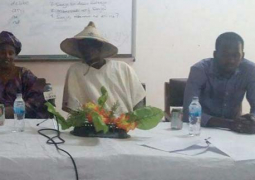The phrase and the reference above were echoed during the homilies of many Christian preachers last weekend. It is through this inspiration that I write this article as a reflection in Christian Panorama.
The full passage is that of Matt. 22:15-22 from where the above phrase is found. The passage was related to the theme of “citizens of two worlds”. The theme explains that Christians are both citizens of the earth beneath and citizens of heaven above where God Almighty dwells. As Christians and citizens we are to pay allegiance to God and his authority and to human authority. All worship, praise and glory belong to God (Ps. 66:1-4) and respect and honour belong to human authority (Rom. 13:1-2).
In the passage of the gospel, Matt. 22:15-22, it is narrated that the Pharisees went aside to plot to trap Jesus. So they all decided to ask him the question whether it is lawful to pay taxes to Caesar or not. Here the Jews were under Roman dominance and ruling. They were meant to be loyal to the Emperor of Rome who was Caesar and paying taxes was one of the ways in which to show loyalty. This would mean also that when one does not pay taxes that will be seen as an offence or sabotage.
Jesus was an authority in the area of Religion and he was also a Jew. In answering the question, if he was to say no, then will answer for it before the Roman authorities. If he was to say yes, the Jews who were not pleased with Roman ruling, would see Jesus as an accomplice or one who would not fight for the cause of Jewish liberation. When Jesus was asked the question, he responded cleverly to say “you hypocrites, why do you set this trap for me? “ (Matt. 22:18). He asked them for a coin and said to them “whose head is this? And whose name?” (Matt. 22:20) The people answered that Caesar’s head was on the coin and rightly so. With this, Jesus answered them by saying, “render unto Caesar what belongs to Caesar and to God what belongs to God.” Jesus’ answer was a just and correct one that raised no arguments. The Biblical reference says, “When they heard this, they were amazed, they left him alone and went away.” (Matt. 22:22).
The Herodias and the people that the Pharisees sent to Jesus would not have anything to say to the Pharisees. Their “mouths were full” to give a literal translation of a wollof saying. In the answer Jesus gave, everything became straightforward and they could not trap Jesus. The implications from the passage and preaching mean that Christians should follow the teachings of Jesus in this episode. One thing that comes out clearly is that the
As citizens to the kingdom of this world in this present century we are meant to obey lawful and rightful authorities. In the letter to the Romans St Paul says, “Everyone is to obey the governing authorities, because there is no authority except from God and so whatever authorities exist have been appointed by God (Rom. 13:1-2). In the same passage St Paul again teaches, “Pay to each one what is due to each: taxes to the one to whom tax is due, tolls to the one to whom tolls are due, respect to the one to whom respect is due, honour to the one to whom homour is due.” (Rom. 13:7)
Presently in The Gambia we are anticipating the coming elections. Elections are one of the ways that loyal citizens should exercise their allegiance to the nation. All well meaning, aged and good citizens, Christians nor not should take part in the coming elections. As citizens, they have their franchise to vote according to choice and according to the future progress and development of the nation. In they way the gospel injunction have it, with the elections and our participation in them, we render unto “Caesar” what belongs to “Caesar”. Christians should vote in the coming elections and should not say that their faith does not allow them to vote.


